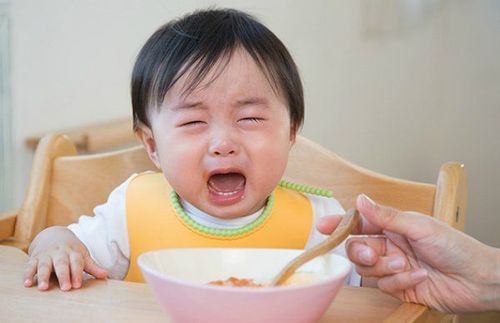This is an automatically translated article.
Children who are lazy to eat are always a problem for parents, even some parents have starved their children in the hope of stimulating their child's appetite. So should children who refuse to eat should starve or not and how to starve appropriately?
1. Is the child really anorexic?
Children who are lazy to eat is a common condition from 1 to 6 years old. Anorexia is simply defined as when a child refuses to eat the required amount of food due to lack of appetite leading to meals lasting more than 30 minutes or even hours.
Causes of children being lazy to eat and anorexia can be divided into the following groups:
Pathology: Due to acute/chronic infection, oral disease, congenital pathology. Nutrition: Food is not suitable for children's taste. Psychological: Children are pampered too much, feeding is not correct (eating while playing, watching TV, phone,...). Due to "parents' diagnosis": Parents always want their children to eat more than they can eat even though the child's condition is currently good, even obese. Neurological: Due to children's misconceptions about the body or psychological damage, common in older children.
2. Should children who refuse to eat should starve?
There will be parents who feel that their child "doesn't know what hunger is", because no matter how hungry they are, they will not see the child asking for food. Or sometimes parents lose patience, will wonder if children who refuse to eat should starve. However, parents need to check for themselves whether they really let their children starve or not? Is the time of starving children long enough for them to feel hunger? Many parents will feel sad when their child has not eaten for just a few hours and then try to entice and compensate for the child to eat more while the child is not hungry.
Always trying to feed the child when the child is not hungry will make the child's stomach always in a "bad" state, the brain will not receive the feeling of hunger and will not send out an appetite signal. As a result, at the main meal, the child will eat less or stop eating, the vicious cycle repeats and the child is accused of "anorexic" according to the parents' standards.
Before affirming that their child "doesn't know what hunger is", parents should answer the question "have I starved my child long enough?"

Giải đáp trẻ không chịu ăn có nên bỏ đói không?
3. How to arouse children's appetite?
To stimulate appetite and form eating habits, parents must adhere to the following principles:
Feed children at the same time as family meals. Feed your child 3 main meals and 2 snacks a day. Snacks must be at least 1.5-2 hours after the next main meal. Time for main meal is 20-30 minutes, snack time is 10-15 minutes. Do not try to force the child to eat more. If your child refuses to eat, respect his or her decision. Parents do not need to give children snacks or snacks. Fasting for 1 or 2 meals does not affect the child's development. For children over 1 year old, do not drink more than 500ml of milk and dairy products in the same day. The purpose of starving children is to help children realize the value of meals and foods and let them enjoy food, develop chewing and swallowing skills. Besides that, parents need to have a suitable nutrition, supplement necessary micronutrients such as: Zinc, selenium, chromium, Vitamins B1 and B6, ginger, acerola fruit extract (vitamin C), ... to improve the taste, eat well, reach the correct height and weight and exceed the standard, have a good immune system, strengthen the resistance so that children are less likely to get sick as well as have less digestive problems.
The improvement of symptoms can take place for a long time, so it is recommended that parents be calm and persistent when supplementing with nutrients for children, even through eating or functional foods. In particular, the use of functional foods should choose those of natural origin that are easily absorbed, do not allow simultaneous use of many types or continuously change the types of functional foods.
To have more knowledge about taking care of children by age, you should regularly visit the website vimec.com and make an appointment with the leading doctors, Pediatricians - Nutritionists when you need advice.













